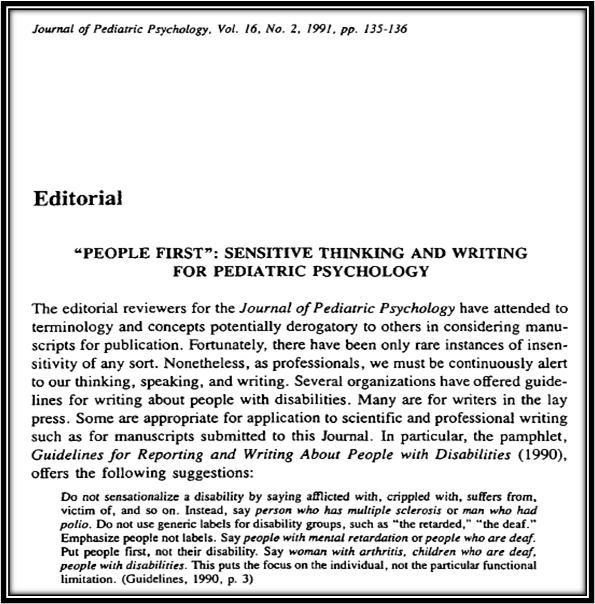History Spotlight: Turn Back Time? The “People First” Publication Policy
Turn Back Time? The “People First” Publication Policy
of the Journal of Pediatric Psychology
By Michael C. Roberts
Society of Pediatric Psychology Co-Historian
After I became editor of Journal of Pediatric Psychology (JPP), I wrote an editorial published in 1991 entitled “‘People First’: Sensitive Thinking and Writing for Pediatric Psychology” (Roberts, 1991, p. 135; see Figure 1). In the editorial, I noted recommended guidelines for writing about people with disabilities that put the “focus on the individual, not the particular functional limitation” (Guidelines, 1990, p. 3). This “people first” terminology movement was also evidenced in the titles of the “American with Disabilities Act” instead of “Disabled Americans Act” and the “Individuals with Disabilities Education Act” instead of “The Education for All Handicapped Children Act,” both were enacted in 1990. This editorial announced that the JPP Editorial Board had added language in the Instructions to Contributors:
The Journal encourages the use of terminology sensitive to the individual with conditions frequently involved in research and practice of pediatric psychology. The Editorial Board endorses the concept of “people first, not their disability” whenever possible (e.g., children who have diabetes, persons with AIDs, parents of children with emotional disorders). Authors should avoid generic labeling for a disability group, such as “the retarded” or “the diabetic.”
JPP was among the first psychology journals to ask authors to use the "People First" terminology and the APA Publication Manual soon included the language style. As editor I was very proud to be at the forefront of activism in response to the disability advocacy movement, especially given the constituency served by pediatric psychology. The “people first” instructions have continued through the years and are retained now in the JPP Instructions for Contributors section entitled: Diversity, Equity, and Inclusion Considerations:
Terminology should be sensitive to the individual who has a disease or disability. The Editors endorse the concept of "people first, not their disability." Terminology should reflect the "person with a disability" (e.g., children with diabetes, persons with HIV infection, families of children with cancer) rather than the condition as an adjective (e.g., diabetic children, HIV patients, cancer families). Nonsexist language should be used.
I do not find this policy in Clinical Practice in Pediatric Psychology instructions.
Now 32 years later, I was recently challenged to consider whether we were correct back in 1991 in establishing the publication policy of “people first.” The challenge to me came from reading a January 2023 essay in Time magazine from Ben Mattlin, a person with a disability (Mattlin, 2023). He described changes in disability advocacy to remove the “people first” terminology that he had previously endorsed because he had earlier viewed it as emphasizing his humanity. Mattlin noted that activists now want to recognize and embrace their disabilities. He acknowledged being resistant but has come around to the idea of putting “disabled first” to serve as a “badge of honor” (p. 20). Following up this challenge, I searched for and found other articles, blogs, and websites in the professional and lay press that similarly argue for language that places “identity-first” (e.g., Ladau, 2021; Okundaye, 2021).
As I thought about this challenge of current activism and advocacy for “disability identity first” instead of “people first” and reflecting on our 1991 (and current) editorial stance, I wanted to avoid presentism – that is, the tendency to use today’s attitudes, values, and language to interpret and judge the past. At the time, we thought it made good sense and was respectful to those we serve. Of course, concepts and language evolved over time, even those at what were the leading edge of activism. The “people first” concept and the editorial policy influenced thinking and writing in the interim years. What is enlightened in society and the professions inevitably changes and often develops a whole new set of terms and perhaps underlying concepts of what is “right” (or, in this case, revert back to earlier existing norms of language that placed a disability first in descriptions).
In light of today’s developments and activism, were we, as editors, editorial board members, reviewers, and authors inadvertently disrespecting those with disabilities? Should we impugn the motives and actions of the pediatric psychology community, including the editors and authors by emphasizing the “people first” phrasing, if the terminologies are now noted as disrespectful or problematic? At one extreme, should we negate the previous actions, rebuke those involved, and censure articles that used “people first” in their content? If we were able to turn back time to apply the stance of disability advocates today to abrogate advocacy of the “people first” policy in the past, should we do it? Should JPP (and APA) reverse or revise the policies? How could we decide collectively how to handle changes in language and philosophies that will inevitably evolve over time, sometimes with rather significant changes? These are challenging questions posed to me as I reflected on the Mattlin (2023) article and other discussions in the literature. If we cannot turn back time to 1991 to preclude the “people first” editorial policy, how do we critically examine language and intentions in an evolving society understanding historical contexts without invoking presentism?
References
Guidelines for reporting and writing about people with disabilities (3rd ed.). (1990). Lawrence, KS: Research & Training Center on Independent Living.
Ladau, E. (2021, July 7). Why person-first language doesn’t always put the person first. Think Inclusive (official blog of MCIE: The Maryland Coalition for Inclusive Education, Inc.). https://www.thinkinclusive.us/post/why-person-first-language-doesnt-always-put-the-person-first
Mattlin, B. (2023, January 16). Learning to celebrate disability culture. Time, pp. 20-21.
Okundaye, J. (2021, April 23). Ask a self-advocate: The pros and cons of person-first and identity-first language. Massachusetts Advocates for Children. https://www.massadvocates.org/news/ask-a-self-advocate-the-pros-and-cons-of-person-first-and-identity-first-language
Roberts, M. C. (1991). Editorial. "People First": Sensitive thinking and writing for pediatric psychology. Journal of Pediatric Psychology, 16, 135-136. doi: 10.1093/jpepsy/16.2.135
07/06/2023
Figure 1. Editorial, Journal of Pediatric Psychology, 1991

